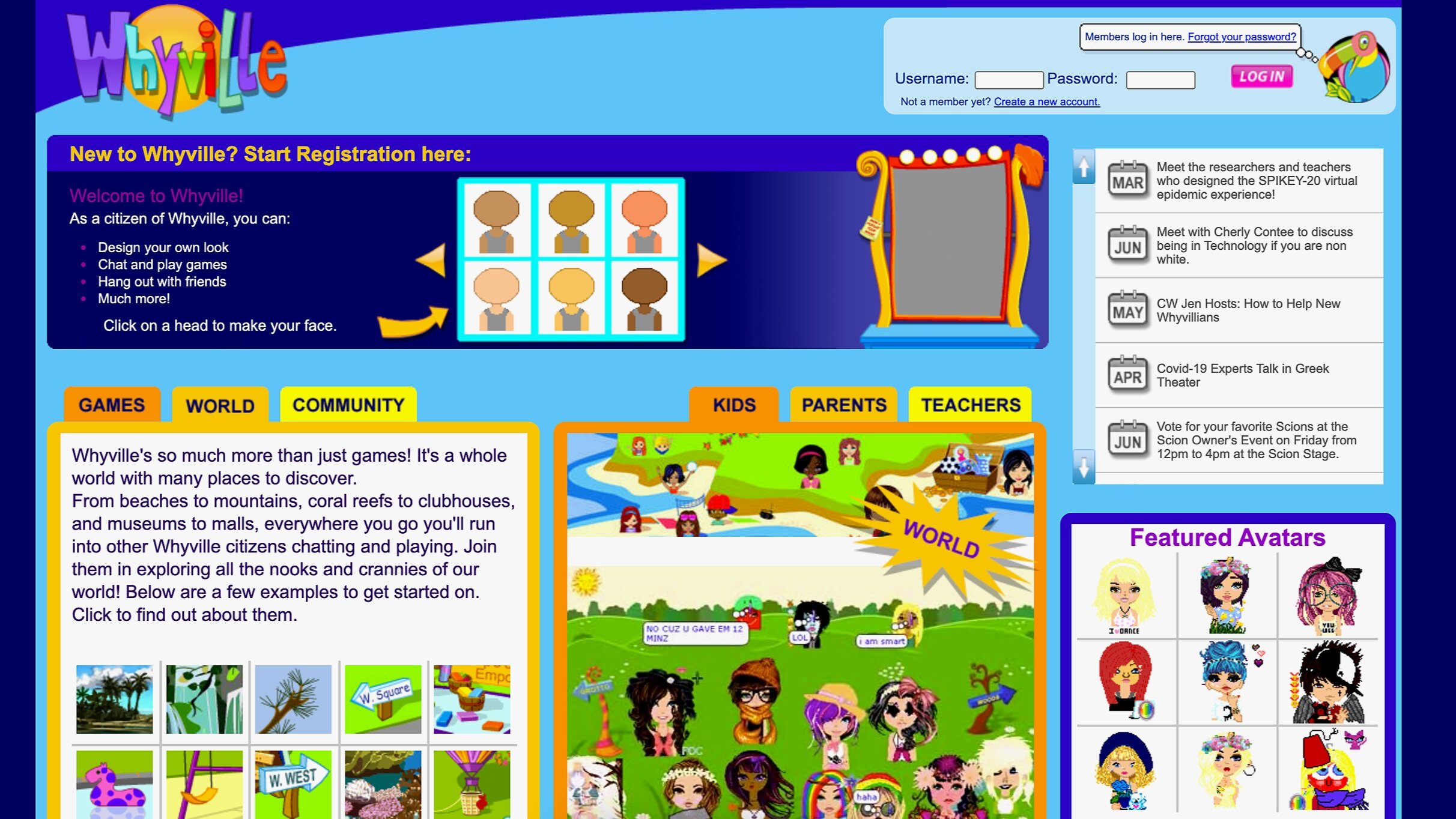World of Whyville
Investigating the social and emotional lives of tweens in whyville.net, one of the first informal virtual worlds. Studies addressed gender and racial issues in avatar constructions, social interactions and flirting, and community policing.
Contributors
Deborah Fields, Kristin Searle, David Feldon, Michael Giang, Melissa Cook, Jacqueline Wong, Nina Fefferman, Estee Ellis
Related Research
Kafai, Y. B. & Dede, C. (2014). Learning in Virtual Worlds. In K. Sawyer (Ed.), Cambridge Handbook of the Learning Sciences, Second Edition (pp. 522-544). New York, NY: Cambridge University Press.
Fields, D. A. & Kafai, Y. B. (2013). Creative play in virtual worlds: Avatar and cheat designs and performances. In C. Mouza and N. Lavigne (Eds.) Emerging Technologies for the Classroom: A Learning Sciences Perspective. New York: Springer. Link to PDF
Kafai, Y. B. & Fields, D. (2013). Collaboration in Informal Learning Environments: Access and Participation in Youth Virtual Communities. In C. Hmelo-Silver, C., O’Donnell, A., Chan, C., & Chinn, C. (Eds.), International Handbook of Collaborative Learning (pp. 480-494). New York, NY: Taylor & Francis.
Fields, D. & Kafai, Y. B. (2012). Navigating Life as an avatar: The Shifting Identities-in-Practice of a Girl Player in a Tween Virtual World. In C. C. Ching and B. Foley (Eds.), Constructing identity in a digital world, Cambridge, UK: Cambridge University Press, 222-250.
Giang, M. T., Kafai, Y. B., Fields, D. A., & Searle, K. A. (2012). Social Interactions in Virtual Worlds: Patterns and Profiles of Tween Relationship Play. Johannes Fromme & Alexander Unger (Eds.), Computer Games/Player/Game Cultures: A Handbook on the State and Perspectives of Digital Games Studies (543-556). New York, NY: Springer Verlag.
Searle, K. A. & Kafai, Y. B. (2012). Beyond freedom of movement: Boys play in a tween virtual world. Games & Culture, 7(4), 281-304.
Kafai, Y. B., & Searle, K. A. (2011). Safeguarding Play in Virtual Worlds: Designs and Perspectives on Tween Player Participation in Community Management. International Journal of Learning and Media, 2, 1-14.
Kafai, Y. B. (Guest Editor) (2010). The World of Whyville: Living, Playing, and Learning in a Tween Virtual World. Games and Culture, 5(1), 3-135.
Kafai, Y. B. (2010). The World of Whyville: An Introduction to Tween Virtual Life. Games and Culture, 5(1), 3-22
Kafai, Y. B., Fields, D.A., & Cook, M. S. (2010). Your Second Selves: Player Designed Avatar Designs. Games and Culture, 5(1), 23-42. Link to PDF
Kafai, Y. B., Cook, M. S., & Fields, D.A. (2010). “Blacks deserve bodies too!” Discussion and Design about Diversity and Race in a Tween Virtual World. Games and Culture, 5(1), 43-63. Link to PDF
Kafai, Y. B., Fields, D.A. & Giang, M. (2009). Transgressive gender play: Profiles and portraits of girl players in a tween virtual world. Proceedings of the Digital Interactive Games Research Association Conference (DiGRA 2009), London, UK. Link to PDF
Kafai, Y. B. & Giang, M. T. (2008). Virtual Playgrounds: Children’s Multi-User Virtual Environments for Playing and Learning with Science. In T. Willoughby & E. Wood (Eds), Children’s Learning in a Digital World (pp. 196-217). Blackwell Publishing, Oxford, UK.
Kafai, Y. B., Cook, M. S., & Fields, D. A. (2007). “Blacks deserve bodies too!” Design and discussion about diversity and race in a tween virtual world. In Akira Baba (Ed.), Situated Play: Proceedings of the Third International Conference of the Digital Games Research Association (DiGRA) (pp. 269-277). Tokyo, Japan: The University of Tokyo. Link to PDF
Kafai, Y. B., Fields, D.A., & Cook, M. S. (2007). Your second selves: Resources, agency and constraints in avatar design in a tween virtual world. In Akira Baba (Ed.), Situated Play: Proceedings of the Third International Conference of the Digital Games Research Association (DiGRA) (pp. 31-39). Tokyo, Japan: The University of Tokyo. Link to PDF



